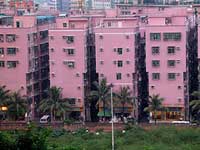Tax on property income in China
Effective Tax Rate on Rental Income |
|||
| Monthly Income | US$1,500 | US$6,000 | US$12,000 |
| Tax Rate | 5.00% | 5.00% | 5.00% |
| Click here to see a worked example | |||
Source: |
Disclaimer | ||
INDIVIDUAL TAXATION
Nonresidents are taxed only on income derived from sources in China. Married couples are assessed and taxed separately since joint taxation is not allowed.
Chinese nationals residing overseas may be considered as residents of China for tax purposes if they are considered domiciled in China. An individual is considered ´domiciled´ in China if he habitually resides in China as a result of household registration, family, or economic interests.
RENTAL INCOME
Only Chinese citizens are allowed to own real property in China.
In general, leasing property is subject to Individual Income Tax (IIT), Business Tax (BT), and Real Estate Tax (RET). In addition to these 3 taxes, some other taxes and surcharges may also be imposed on rental income, varying from city to city.
However, local governments of some provinces are given much authority in terms of taxation. Therefore, tax rates and computation of taxable income vary from city to city (see discussion on taxation in Shanghai below).
Income Tax

Investment income, including rental income, is taxed at a flat withholding rate of 20% of the gross income.
Business Tax
Nonresidents earning rental income are liable for business tax at 3%. The taxable income is computed by deducting business tax, operating expenses, administrative expenses, and financial expenses from the gross income.
Real Estate Tax
Urban real property tax applies to foreign investor enterprises and individuals. The owners of real property (but not land) are liable to this tax, levied at 1.2% of its assessed value.
If the property is rented out, the applicable tax rate is 12% and it is levied on the annual rental income. The rate may be reduced to 4% for leasing residential property. However, the practice may vary across China since applicable tax rates are determined by the local authorities.
This tax is payable to the local governments, and is paid annually, with payments by installments.
In Shanghai, all the mentioned taxes and surcharges imposed on rental income from leasing properties have been levied at an integrated rate of 5% on the gross income since 01 August 1999.
CAPITAL GAINS
Only Chinese citizens are allowed to own real property in China.
Income Tax
Net gains from transfer of property are taxed at a flat rate of 20%. The taxable income is the gross selling price less acquisition costs and related reasonable expenses. The maximum deduction for real estate development expenses is around 10% of the property cost.
Business Tax
Sales of immovable properties are subject to business tax, which is imposed at 5% of the net gains.
Property which has been owner-occupied for five years prior to the sale is exempt. In Beijing the period is one year.
Land Appreciation Tax
Land appreciation tax is a transaction tax on the transfer of the rights to use state-owned land in China. It is based on the net gain and imposed at progressive rates. The taxable gain is computed by deducting the following from the proceeds of the transfer: the cost of acquiring the property, development expenses, repair and maintenance expenses, relevant tax payments, and other amounts considered by tax authorities to be deductible.
Tax rates start at 30% and can go up to 60% depending on the tax base, which is the valuation of the net gains in connection with the total deductions.
LAND APPRECIATION TAX |
|
| TAXABLE BASE (Net Gains) | |
| Up to 50% of all deductions | |
| 50% - 100% of all deductions | |
| 100% - 200% of all deductions | |
| Over 200% of all deductions | |
In Shanghai a composite tax rate of 5% is applied to the net proceeds from the sale of villas (this includes income tax, business tax, land value appreciation tax, city construction surtax, education surtax), while tax exemption is available for ordinary residential apartments.
CORPORATE TAXATION
INCOME TAX
Income earned by companies is generally taxed at a flat rate of 25%. Taxable income generally includes profits, capital gains, and passive income such as interest, royalties, and rents. Income-generating expenses are deductible when calculating taxable income.
Net gains from transfer of property are taxed at a flat rate of 20%. The taxable income is the gross selling price less acquisition costs and related reasonable expenses. The maximum deduction for real estate development expenses is around 10% of the property cost.
Business Tax
Business tax is a turnover tax imposed on activities involving immovable properties and intangible goods and services. Business tax rates vary from 3% to 20%, depending on the nature of goods and services.
Sales of immovable properties are subject to business tax, which is imposed at 5% of the net gains.
Land Appreciation Tax
Land appreciation tax is a transaction tax on the transfer of the rights to use state-owned land in China. It is based on the net gain and imposed at progressive rates. The taxable gain is computed by deducting the following from the proceeds of the transfer: the cost of acquiring the property, development expenses, repair and maintenance expenses, relevant tax payments, and other amounts considered by tax authorities to be deductible.
Tax rates start at 30% and can go up to 60% depending on the tax base, which is the valuation of the net gains in connection with the total deductions.
LAND APPRECIATION TAX |
|
| TAXABLE BASE (Net Gains) | |
| Up to 50% of all deductions | |
| 50% - 100% of all deductions | |
| 100% - 200% of all deductions | |
| Over 200% of all deductions | |